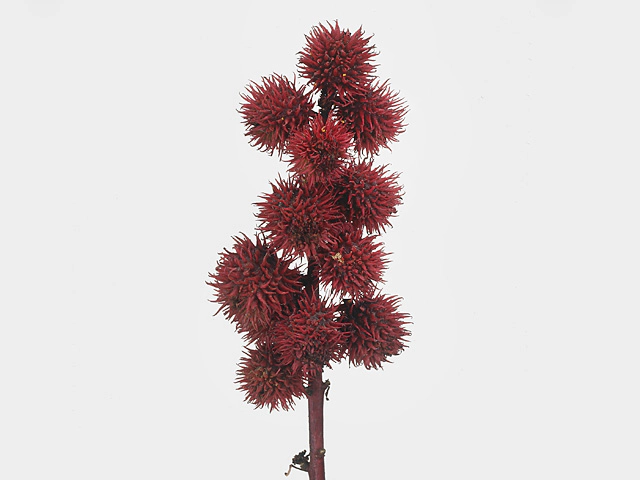Ricinus communis 'Impala'

The Ricinus communis 'Impala,' also known as the castor oil plant, is a unique and versatile plant that has numerous benefits and uses. Native to Africa, this plant has gained popularity around the world for its distinct appearance and various applications. Let's explore the characteristics and uses of this fascinating plant.
The castor oil plant is an evergreen shrub that can reach a height of up to 10 feet (3 meters). It features large, palm-shaped leaves that are glossy and vibrant green. However, what truly sets this plant apart are its striking seed capsules. These capsules are spiky and prickly, resembling small hedgehogs. Inside the capsules are the plant's seeds, which have a glossy, mottled appearance.
One of the most well-known uses of the castor oil plant is the extraction of castor oil from its seeds. Castor oil is a versatile and highly beneficial oil that has been used for centuries for various purposes. It is commonly used in the cosmetic industry as an ingredient in skincare products, as it possesses moisturizing and nourishing properties. Castor oil is also utilized in the pharmaceutical industry, where it is utilized in medicines, ointments, and treatments for various ailments.
Apart from its oil extraction, the castor oil plant is also cultivated for ornamental purposes. Its unique appearance and bold foliage make it an attractive addition to gardens and landscapes. The 'Impala' cultivar, in particular, is highly sought after for its compact size, making it suitable for small gardens or container growing.
However, it is important to note that while the castor oil plant offers numerous benefits, it is also considered somewhat toxic. The seeds contain a toxin called ricin, which can cause harm if ingested. Therefore, it is crucial to handle the plant with caution, especially when it comes to disposing of its seeds.
In addition to its uses in various industries, the castor oil plant is also known for its ecological benefits. It is a highly resilient plant that can thrive in a wide range of soil conditions, making it ideal for erosion control measures. The plant's extensive root system helps prevent soil erosion, making it particularly useful in areas prone to erosion, such as slopes or river banks.
Moreover, the castor oil plant also has phytoremediation properties, meaning it can help remove or neutralize pollutants from the soil. This makes it a valuable plant for environmental restoration projects, as it can help improve soil quality and promote overall ecological balance.
In conclusion, the Ricinus communis 'Impala,' or castor oil plant, is a versatile and unique plant with a wide range of applications. From its oil extraction for cosmetic and medicinal purposes to its ornamental value and ecological benefits, this plant offers a lot to admire. However, it is important to handle the plant with care due to the presence of the toxin ricin in its seeds. With its striking appearance and multifaceted uses, the castor oil plant is a valuable addition to any garden or landscape.
Market availability index by month:
| Jan. | Feb. | Mar. | Apr. | May | Jun. | Jul. | Aug. | Sep. | Oct. | Nov. | Dec. |
|---|---|---|---|---|---|---|---|---|---|---|---|
| 3 | 3 | 3 | 3 | 4 | 3 | 3 | 3 | 3 | 4 | 4 | 4 |